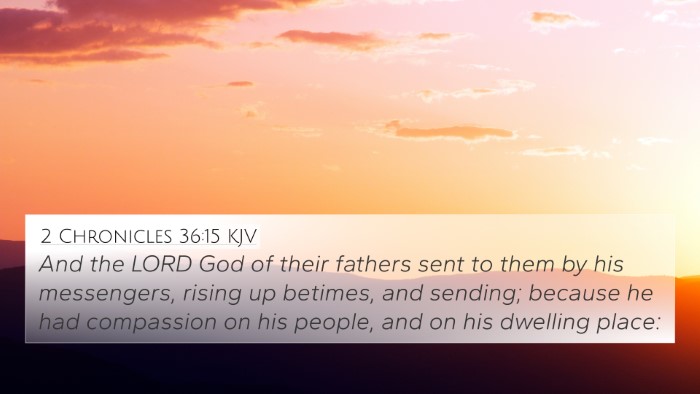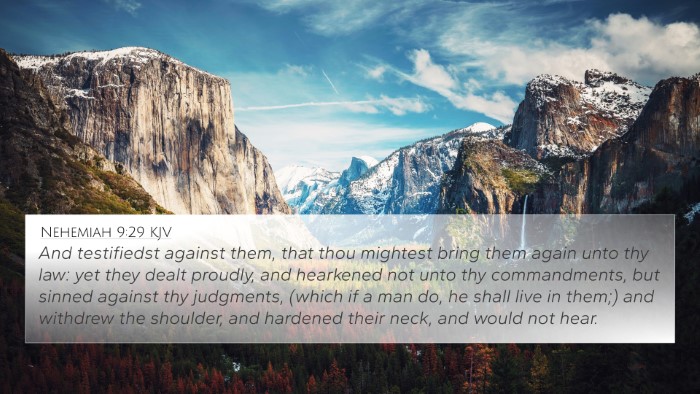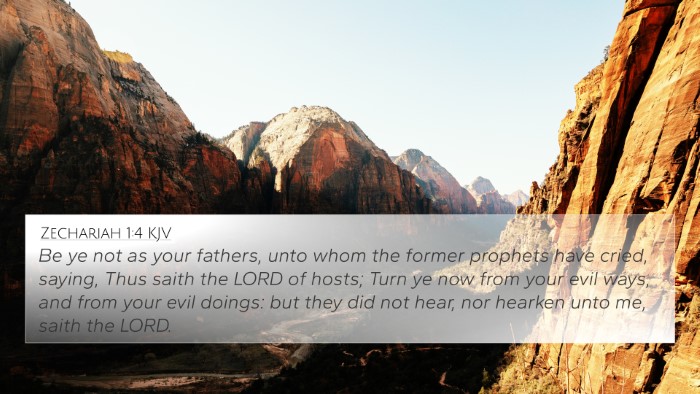Understanding 2 Chronicles 33:10
2 Chronicles 33:10 states, "And the Lord spake to Manasseh, and to his people: but they would not hearken." This verse captures a pivotal moment in the narrative of King Manasseh's reign, highlighting themes of divine communication, rebellion, and the consequences of turning away from God's voice.
Analysis from Public Domain Commentaries
Matthew Henry's Commentary:
Henry emphasizes that despite God's clear communication and warnings to Manasseh and his people, they chose not to heed His words. This illustrates a common human tendency to resist divine counsel, showcasing the gravity of rejecting God's commands. The refusal to listen signifies a hardened heart, a theme prevalent in the Old Testament that leads to dire consequences for individuals and nations alike.
Albert Barnes' Notes:
Barnes points out that God's willingness to speak even after the king's notorious sins showcases His mercy. The verse serves as a warning against the obstinate hearts of those who refuse to listen. The implication here is that God seeks our attention and desires a relationship, yet the choice to be obstinate can lead to spiritual downfall. This sets the stage for understanding God’s judgment juxtaposed with His desire for repentance.
Adam Clarke's Commentary:
Clarke remarks that this passage underscores the importance of being receptive to God’s messages. The rejection by Manasseh’s people serves as a reminder of collective rebellion against divine authority. Clarke also elaborates that divine warnings are not only for kings but are applicable to all individuals, as they reflect God's unending invitation to redemption and communication.
Thematic Connections
This verse connects with several themes and passages within Scripture:
- Divine Communication: Related to Jeremiah 7:13, where God acknowledges that He has spoken to the people, yet they did not listen.
- Rebellion Against God: Connects with Proverbs 1:24-26, which speaks of God calling and people rejecting His counsel.
- Consequences of Disobedience: Ties to Isaiah 30:9-11, emphasizing the stubbornness of the people and the resulting judgment.
- God's Offer of Repentance: Reflected in 2 Chronicles 7:14, where humility and seeking of God are encouraged, contrasting the rejection faced in this passage.
- The Heart's Hardness: Related to Ezekiel 36:26, where God promises to give a new heart to those who turn back to Him.
- Grace and Mercy: Illustrated in Psalm 86:15, where God is noted for being merciful and compassionate, despite human tendencies to stray.
- Spiritual Blindness: Similar to Matthew 13:14-15, where Jesus speaks about people's hearts being hardened to the truth.
Cross-References and Their Implications
To gain deeper insights into 2 Chronicles 33:10, consider the following cross-references:
- 1 Kings 12:28-30: This passage discusses the consequences of leading others into idolatry, mirroring Manasseh's actions and rebellion.
- Deuteronomy 28:15: Warns of curses for disobedience, highlighting the consequences of ignoring God's voice.
- Hebrews 3:15: Encourages believers to listen to God's voice today, echoing the themes of responsiveness.
- James 1:22-24: This encourages doers of the word, showing the importance of not just hearing but acting upon God’s instructions.
- Revelation 3:20: Depicts Jesus' invitation to enter the hearts of those who hear His voice, contrasting with the rejection seen in Manasseh’s story.
- Romans 10:21: Paul reflects on Israel’s disobedience; linking this concept to the rejection faced by the Lord in Manasseh’s time.
Tools and Resources for Cross-Referencing
To study these connections and explore other Biblical verses thematically, there are several resources available:
- Bible Concordance: A useful tool for identifying related verses and themes.
- Bible Cross-Reference Guide: Helps in finding verses that support specific themes, such as obedience and rebellion.
- Bible Chain References: A method for connecting verses using themes and keywords to provide context.
Finding Relationships in Scripture
Understanding how verses relate to each other can be invaluable for anyone seeking deeper insights into the Bible. Here are some suggestions for finding cross-references:
- Use resources such as a concordance to identify verses related to specific themes or words.
- Engage in cross-reference Bible studies that encourage exploring relationships between passages.
- Develop a method to categorize themes, allowing for easier identification of related verses.
User Intent Keywords
When searching for connections related to 2 Chronicles 33:10, consider the following queries:
- What verses are related to 2 Chronicles 33:10?
- How do Jeremiah 7:13 and 2 Chronicles 33:10 connect?
- Find cross-references for 2 Chronicles 33:10.
Conclusion
2 Chronicles 33:10 stands as a solemn reminder of the consequences of ignoring God's voice. The insights gathered from respected commentaries, alongside relevant cross-references, enrich our understanding of the importance of heeding divine communication. We see both a warning and an invitation in this scripture, encouraging readers to reflect on their receptivity to God's words and the impact of collective disobedience. Should we embrace His calls, we can avoid the pitfalls exhibited by King Manasseh and instead pursue a life aligned with God’s will.








